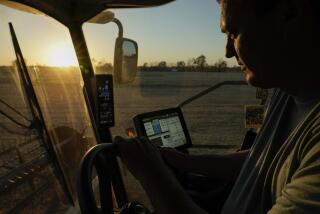Diversifying in Eastern Kentucky : Tobacco Farmers Also Becoming Shepherds
- Share via
PIKEVILLE, Ky. — Farmers struggling against increasingly uncertain tobacco profits are diversifying in the rugged highlands of eastern Kentucky--they’re becoming shepherds.
One of the driving forces in the change is Mike Hancock, a teacher at Harry Sparks Vocational School in Mount Vernon. He has been promoting sheep raising in 16 counties in a program sponsored by the state Office of Vocational Education.
“We’ve got farmers doing very well with sheep in these depressed farm times,” Hancock said.
Morehead State University, with a $136,404 grant from the Appalachian Regional Commission, hopes to boost Kentucky’s sheep flocks, which currently total 27,000 sheep and lambs in a $1.1 million-a-year industry. The university plans to help farmers start herds on 18 farms in the spring.
Major Sheep Producer
Eastern Kentucky was a major sheep producer before World War II and “it’s an industry well suited to the region’s steep and hilly land,” said Charles Derrickson, dean of Morehead’s College of Applied Sciences and Technology.
Hancock said he has watched the flocks in his area grow from about 1,000 ewes on 24 farms to nearly 8,000 on about 100 farms since he started his program in 1979. An annual April lamb sale started four years ago at Monticello draws participants from as far away as Ohio, Indiana, Louisiana and Texas, he said.
Sheep, he said, “like high, rolling country. They’re ideal for this kind of land. They are very effective forage consumers. They eat a lot of weeds and plants the cattle won’t eat.”
The region’s small family farms have the people available for the labor-intensive task of caring for sheep, he added.
Births occur in the cold winter months, when, as it happens, tobacco barns on most farms are available, Hancock said. “They strip the tobacco out in November and December and move the sheep in in January.”
Charles Cornett, who was raising sheep when Hancock started his program, attested to the attention required to be sure lambs born on freezing nights are nursing properly.
Checks During Night
“I devote quite a bit of time to them when they’re lambing. I personally do the checking during the night, at 10 p.m. and 5 a.m.,” Cornett said.
He started with 25 ewes in 1973 on his farm northeast of Manchester in Clay County, known mostly for its coal mining and now has 200.
His two sons and some hired hands care for the sheep in what otherwise would be a slack time after completion of tobacco stripping, and in spring, when farm income normally is at a halt, lamb sales starting in April begin bringing in money, Cornett said.
“You can’t just turn ewes out like beef cattle and let them take care of themselves,” he said. But if the labor is available, sheep are more profitable than cattle, which he also raises.
More to Read
Sign up for Essential California
The most important California stories and recommendations in your inbox every morning.
You may occasionally receive promotional content from the Los Angeles Times.











